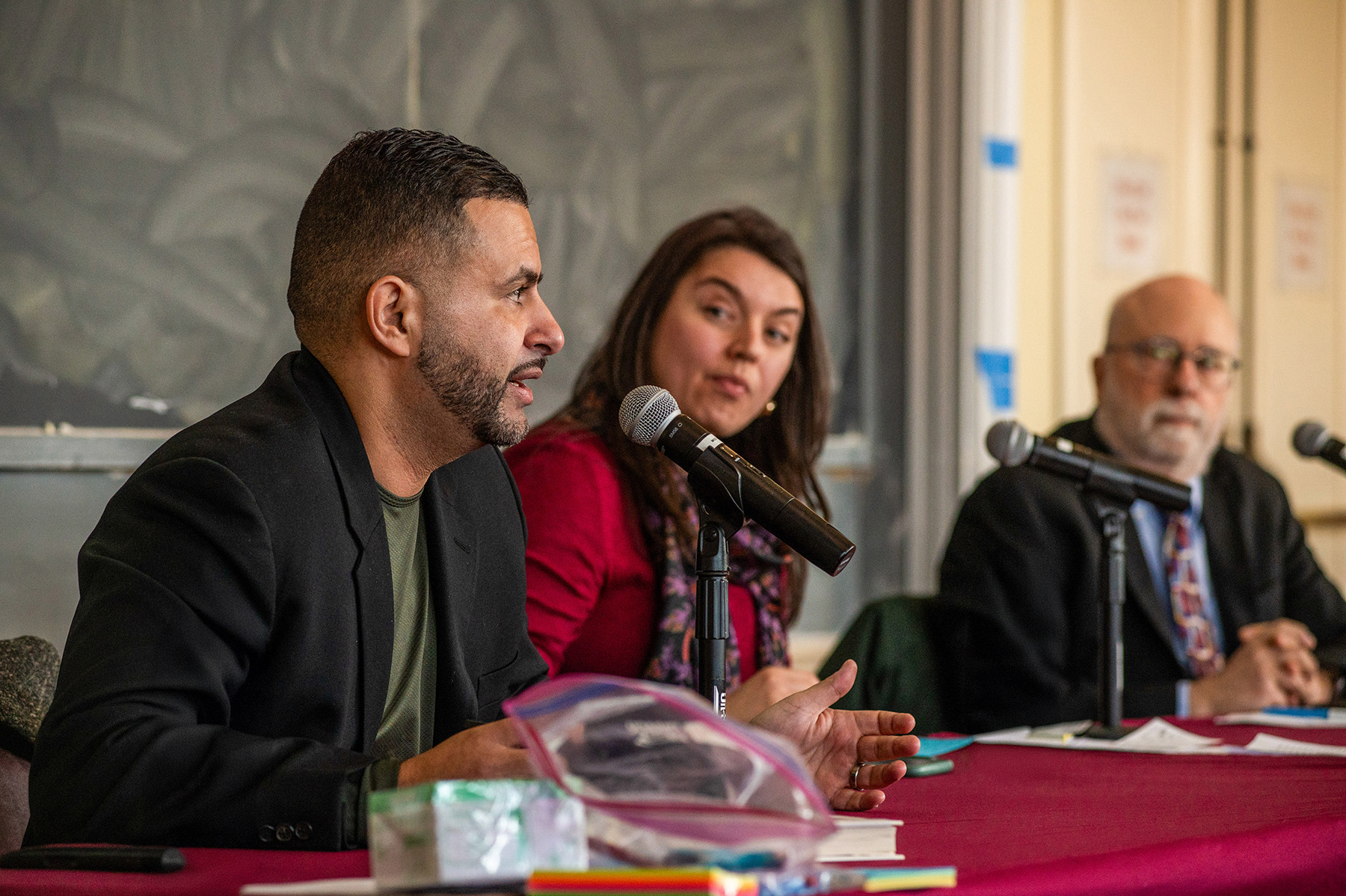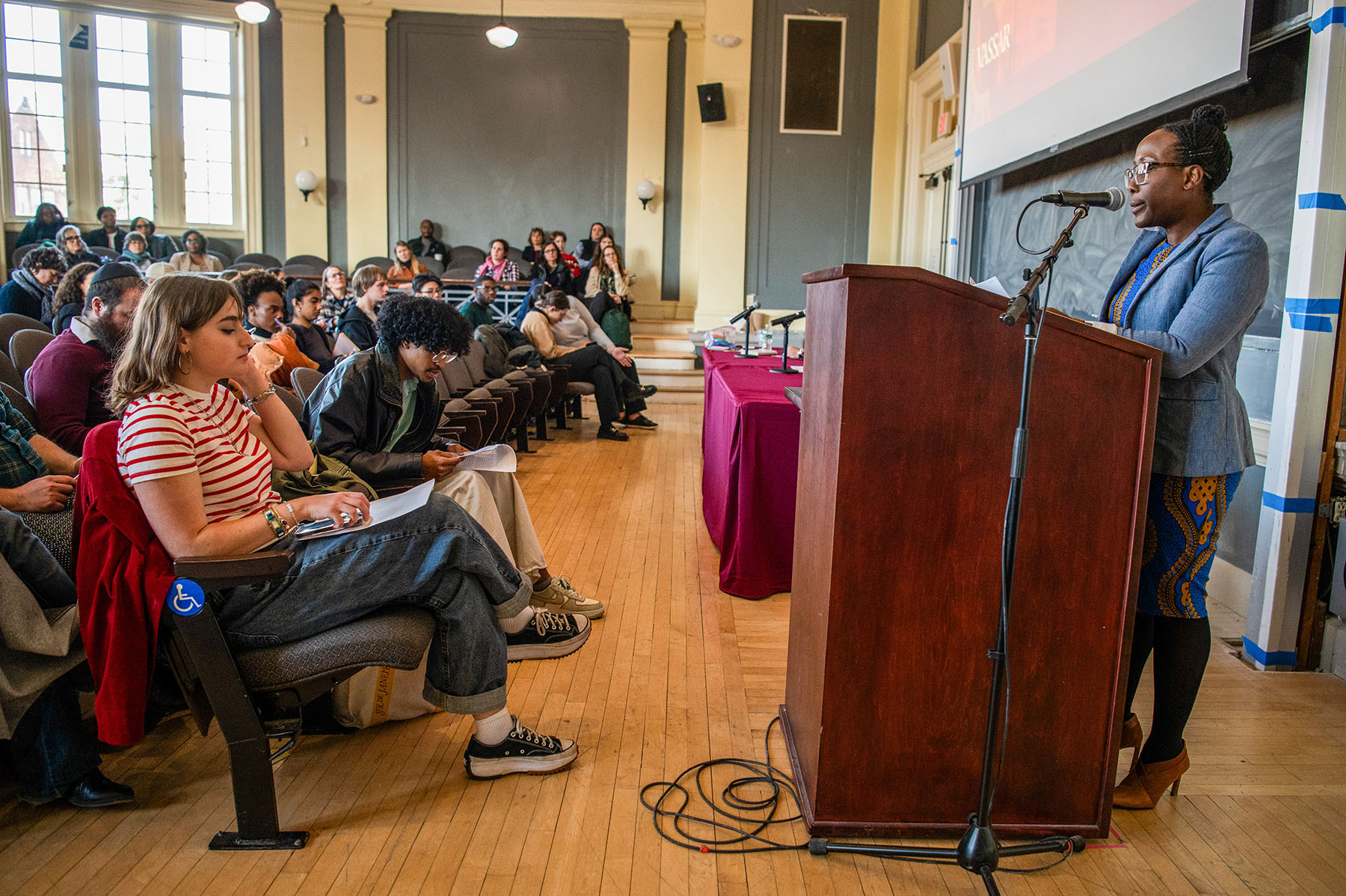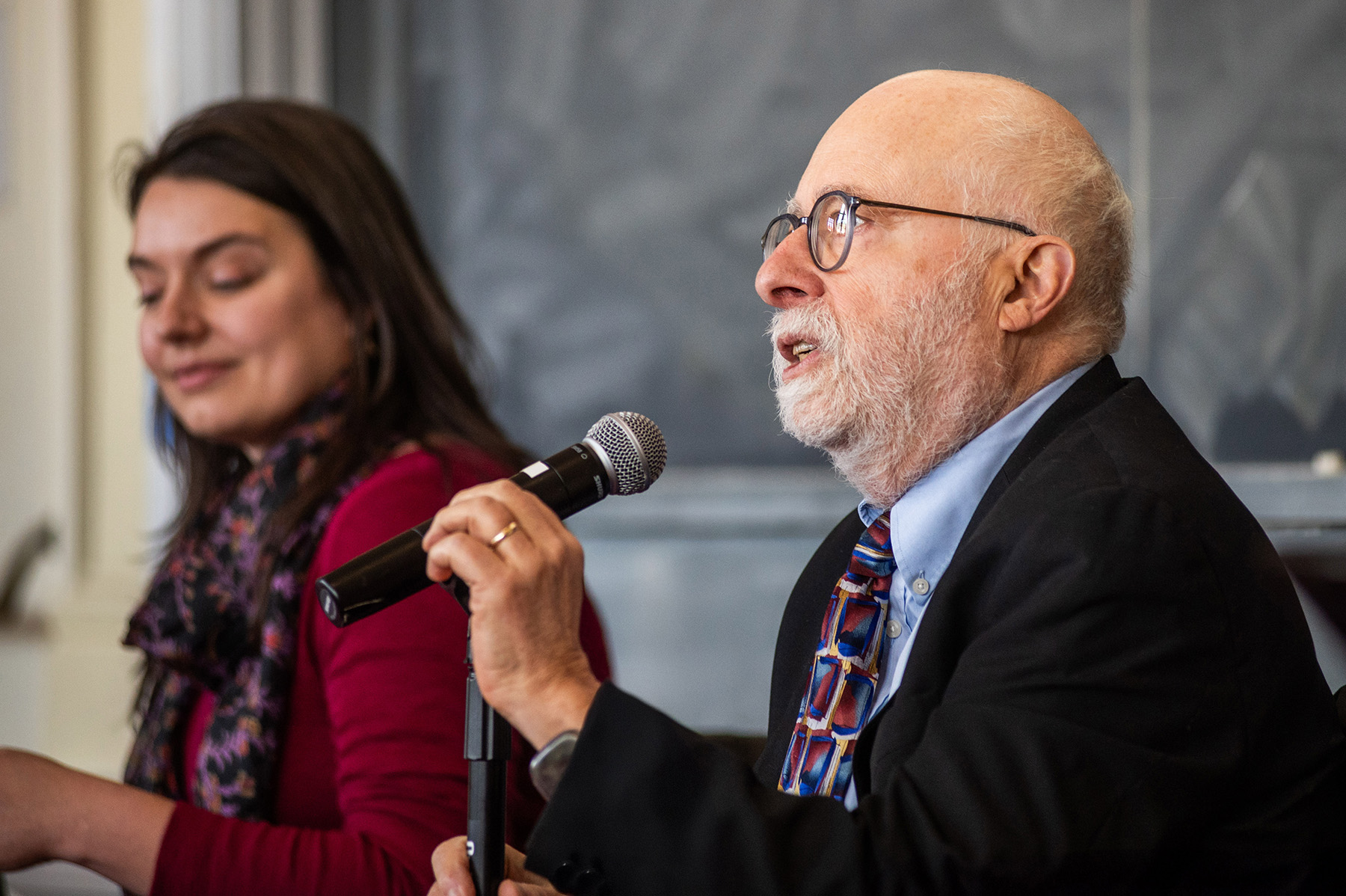Vassar Hosts Scholarly Conversation on Islamophobia, Antisemitism, and Free Speech
Inviting a pair of scholars whose work focuses on racial and religious discrimination to speak in the same room on a college campus at the same time was perhaps puzzling to some, because their scholarly work on Islamophobia and antisemitism may seem in opposition to each other. But Vassar’s Engaged Pluralism (EP) Director and Associate Professor of Education Kimberly Williams Brown said she and others at the College thought it was important, so EP hosted such an event on April 10 in Rockefeller Hall.

“That false dichotomy,” Williams Brown said, “is exactly why a conversation between legal scholars deeply read and practiced in legal scholarship, as well as issues of free speech, is necessary.” She said she and others at the College thought the event illuminated their long-term goal to build capacity for dialogue across differences on campus.
The speakers were Khaled Beydoun, Associate Professor of Law, Sandra Day O’Connor College of Law, Arizona State University, and Ken Stern, Director of the Bard Center for the Study of Hate. The conversation was moderated by Associate Professor of Religion Kirsten Wesselhoeft, who is a scholar of religious ethics and social movements, focusing on contemporary Muslim cultures. More than 150 people from Vassar and the surrounding community attended the event, titled “Islamophobia and Antisemitism: Hate and the Contours of Speech and Expression.”
Wesselhoeft was careful to call the event a dialogue, not a debate. “This was not the debate that some people might have expected,” she said. “Rather, it was a conversation between two scholars who share many of the same ways of addressing systemic biases,” she said.
During the event, one off-campus spectator made Islamophobic remarks directed at Professor Beydoun. Members of the audience, especially those members whose identities were implicated in the comments, were visibly disturbed by the outburst, and college administrators escorted the guest out. There were a few more instances of disruptions by other members of the audience who were non-Vassar guests; they were not escorted out. Beydoun and Stern used the incidents as moments to teach about the principles of Islamophobia and antisemitism, how they show up, and the terror they produce when they are deployed. Wesselhoeft, in her role as moderator, skillfully kept the conversation moving through multiple disruptions.

During his part of the conversation, Beydoun noted that Islamophobia had increased in the United States considerably following the September 11, 2001 terrorist attacks on the World Trade Center and the Pentagon, and the subsequent passage of an anti-terrorism law commonly called the Patriot Act. “It was a law that was essentially conflating expressions of Muslim identity with the prospect or the presumption of terrorism, whether it was policies like the Patriot Act,” he said, “whether it was local policy like counter-radicalization policing in cities like Boston, Minneapolis, in Los Angeles or Detroit, where I’m from; no-fly lists, terror watch lists, things of that nature, where there was a real burgeoning architecture of policy that was tethering expressions, whether racialized or religious, of Muslim identity to this suspicion of terrorism.”
Stern, who has been an adviser to numerous groups on the threat of antisemitism, said during the event that he was comfortable appearing in an event with Beydoun. “He is a good-faith participant; he is somebody who has his views, and I had my views,” he said. “We disagree on many things, but we agree on, I think, the two most fundamental things. Number one, that speech needs to be engaged, even when it’s speech that you vehemently disagree with. The second most important thing is just having a collegial conversation that is built around good faith and mutual understanding. I don’t have to walk away and agree on what he said, and he doesn’t have to agree on what I said. But we can walk away having benefited from a conversation that I think can serve as a model for other people to have in communities and campuses like this.”

Stern, when asked, “What is antisemitism?” said, “There are a variety of definitions, and the major thing that they all have in common, which is the key part of what antisemitism is at its most dangerous,” Stern said. “It’s a conspiracy theory that claims that Jews are conspiring to harm humanity, from the killing of Jesus, to the poisoning of whales, to all the other things that Marjorie Taylor Greene says, and Jewish space lasers. It’s all that’s the premise of it—that Jews are conspiring to harm humanity and that that conspiracy explains what goes wrong in the world. That’s the core of when antisemitism is the most significant and difficult.”
“The other thing that I think is even more significant,” Stern continued, “is how do you fight antisemitism, what drives people into thinking about antisemitism, is it [that it] gives an illusionary, simple solution to thinking about antisemitism? Do we put it on this side of the line or that side of the line without looking at the forces that drive people into antisemitic modes of thinking, right? So, to give you one example of how it blinds us, the [shooting at the] Tree of Life Synagogue was clearly antisemitic, you don’t need a definition to know that, right? The Walmart shooting of a few months later of Mexican Americans and Mexicans was driven by the same ideology, fearing of invaders coming across the southern border. The Tree of Life shooting happened because there was a program at the synagogue that was dealing with support for immigrants. We don’t consider the Walmart shooting at all, and when we’re looking at antisemitism, but the shooters, including the Buffalo one, had the same ideology.”
The disturbances that occurred during the event notwithstanding, Williams Brown called the event a success. “The event went as well as it could have,” she said. “We carefully weighed the pros and cons of having such an event and decided it would be beneficial to the campus and the community, and Professor Wesselhoeft was a good moderator because she understands the issues deeply and can articulate a set of questions that allow the scholars to be in deeper conversation.”
Williams Brown also said she was particularly pleased to see some members of the audience who had interrupted Beydoun while he was speaking approach him afterwards and apologize. “That spoke volumes about the kind of work we are doing in Engaged Pluralism,” she said. “I’m proud of our campus community, even those who showed up and were skeptical that we could build on the work of engaging with people we don’t agree with.”
Wesselhoeft agreed. “I’m not sure any single event can change campus culture in a measurable way,” she said. “The impact of events like this one is cumulative and long-term, in the way they offer resources for people to perhaps think differently over time. I hope that audience members took away points and experiences that they can continue to reflect on.”
Following the event on April 9, there were two separate events on April 10 led by Beydoun and Stern, each attracting attendees from constituent groups across campus (faculty, students, staff, and administrators).
On April 17 and April 21, there were two post-session events facilitated by Williams Brown and Amanda Munroe, director of Restorative Practices. The events used the Intergroup Dialogue facilitation technique to provide additional space for members of the community to process their feelings, and to be in community about the Beydoun/Stern events. The spaces were an important scaffolded follow-up for those who continue to need space to discuss the multi-day Beydoun/Stern events. “Engaged Pluralism’s goal,” said Williams Brown, “is to offer more sessions that build our campus capacity for difficult dialogues. Continue to watch for events that do that.”